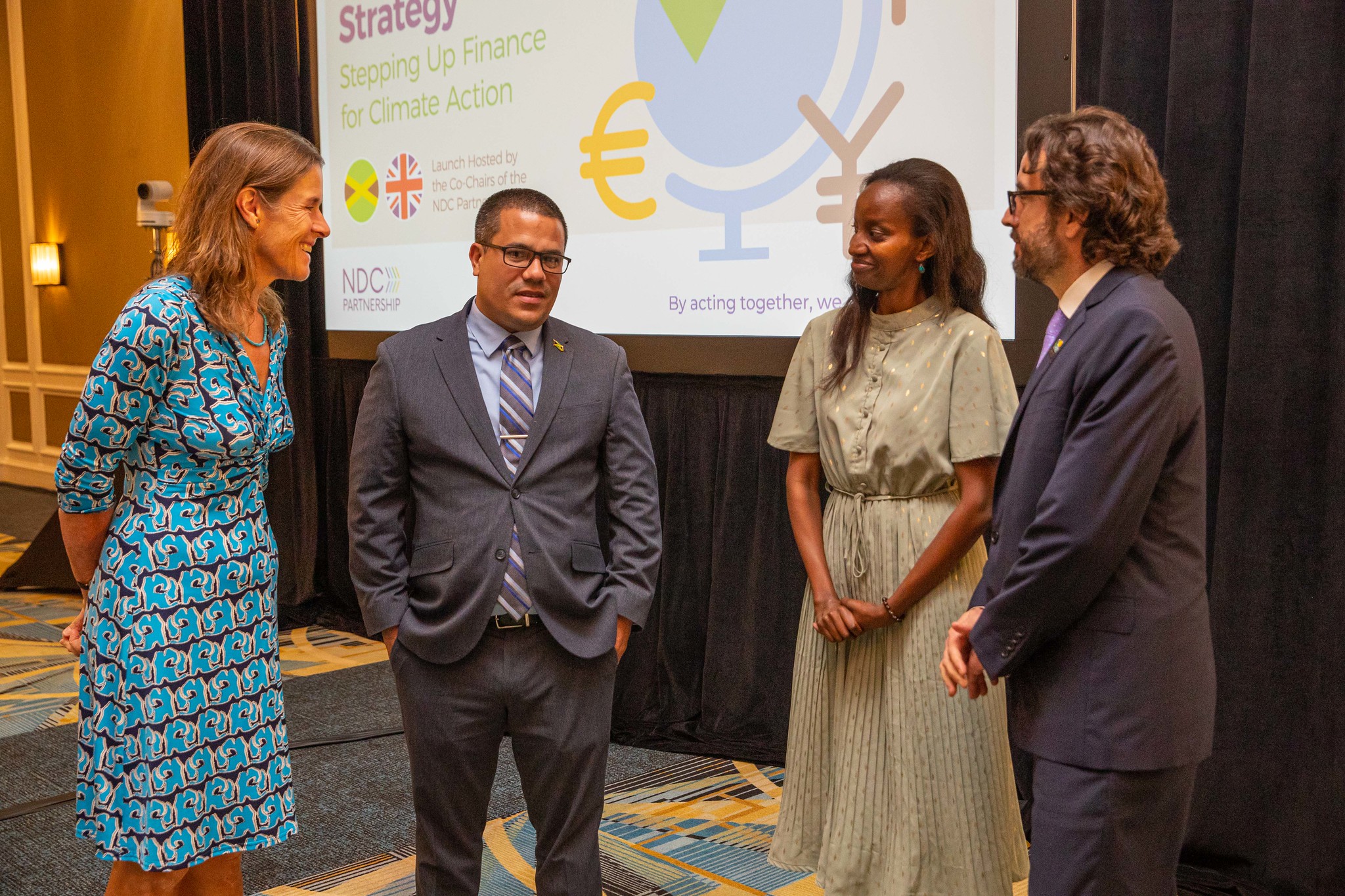Developing Countries Provided With Enhanced Financing Tools to Ramp Up Implementation of Climate Measures

From left: British High Commissioner, HE Judith Slater; Senator the Honourable Matthew Samuda, Jamaica, Minister without Portfolio in the Ministry of Economic Growth and Job Creation; Ms. Beatrice Cyiza, Director General, Environment and Climate Change, Ministry of Environment, Rwanda; and NDC Partnership Global Director Pablo Vieira
15 April 2022 – Developing countries will now have access to new climate funding and finance tools to address climate change, thanks to a new Finance Strategy launched by the NDC Partnership in Montego Bay, Jamaica.
Prime Minister of Jamaica Andrew Holness launched the Strategy with NDC Partnership Co-Chairs, Senator the Honourable Matthew Samuda of Jamaica, Minister without Portfolio in the Ministry of Economic Growth and Job Creation, and The Right Honourable Alok Sharma of the United Kingdom, Member of Parliament and COP President, with the ambition to support developing countries in implementing their established climate commitments.
Through the Partnership’s unique model of cooperation, the Finance Strategy will help advance the financial support available to developing countries to drive transformational investments across national, regional and international levels, while promoting sustainable development. The new package of initiatives will:
- Allow countries to strengthen their capacity by deploying specialist advisors to sectoral ministries and national development banks,
- Provide guidance to countries developing their own NDC financing strategies in collaboration with Development and Implementing Partners, allowing countries to align their NDCs with wider development plans,
- Embed advisors and provide specialized technical assistance to aid central banks with greening their financial systems,
- Facilitate private sector input and buy-in on financing strategies to enable the implementation of NDCs, and
- Support developing countries in identifying financing needs and prioritizing projects, as well as assist finance ministries and national development banks in presenting project ideas and proposals to stakeholders.
The new Finance Strategy will build upon the Partnership’s work over the last five years, which saw the mobilization of around USD1 billion to support developing countries with climate action. Yet, much more is needed. In the third volume of the Intergovernmental Panel on Climate Change (IPCC)’s Sixth Assessment Report, Climate Change 2022: Mitigation of Climate Change, the IPCC warns that we are not on track to meet the 1.5°C target, and with current measures, warming could exceed 3.2°C above pre-industrial levels. The report makes clear that avoiding this level of warming will require far greater levels of action, which will in turn mean deploying finance at a much greater scale.
During the first enhancement cycle of the Paris Agreement, most developing countries brought forward more ambitious climate commitments. Following COP26 in Glasgow, countries are now rapidly turning their attention towards implementation. Yet, implementing the economy-wide transitions that countries are working towards will require the mobilization of finance at a speed and scale previously unseen. In its World Energy Transition Outlook, NDC Partnership Member, the International Renewable Energy Agency estimates that USD51 trillion will be needed in cumulative energy investments between 2021 and 2030 alone to achieve the 1.5°C scenario.
"As a small island developing state, the 1.5° goal of the Paris Agreement is not an abstract target but a matter of survival," said Prime Minister Holness. "That is why the development and launch of the NDC Partnership’s Finance Strategy is so important and timely. Developing countries have shown that we are ready to take ambitious action to limit emissions and protect our people from the impacts of climate change. But delivering on that commitment will mean unlocking finance faster and at a greater scale than ever before. Working with the NDC Partnership, Jamaica has developed a framework for action that will bring benefits both to our people and to the global fight against climate change. This is the time to bring international finance to bear.”
"The Partnership’s Finance Strategy provides a strong signal to members and global leaders that raised ambition in developing countries must be urgently matched with large-scale, predictable and timely financing. Jamaica has elaborated a well-defined NDC Partnership Plan with bold and ambitious actions and we invite our partners to meaningfully coalesce their support and financing around this plan so that we can march forward together towards 2050,” added Senator Samuda.
The Right Honourable Alok Sharma of the United Kingdom, Member of Parliament and COP President added:
“At COP26 we collectively made significant progress, but we know that now is the time to turn commitments and ambition into action. Unlocking the flow of finance into developing countries is critical. As developed countries, we have a strong responsibility to deliver, aiming to mobilize USD500 billion in climate finance between 2021 and 2025. When the money is deployed, we must ensure it lands in the right place and delivers the desired impact. The NDC Partnership has shown that by combining countries’ leadership with a coordinated response from international partners, technical and financial support can be mobilized effectively.”
To learn more about the NDC Partnership's Finance Strategy, read the full strategy here.
For media enquiries:
Caitlin Pinkard / caitlin.pinkard@ndcpartnership.org
About the NDC Partnership
The NDC Partnership brings together more than 200 members, including more than 115 countries, developed and developing, and more than 80 institutions to create and deliver on ambitious climate action that help achieve the Paris Agreement and the Sustainable Development Goals (SDGs). Governments identify their NDC implementation priorities and the type of support that is needed to translate them into actionable policies and programs. Based on these requests, the membership offers a tailored package of expertise, technical assistance, and funding. This collaborative response provides developing countries with efficient access to a wide range of resources to adapt to and mitigate climate change and foster more equitable and sustainable development.
